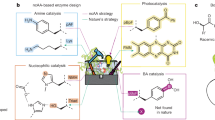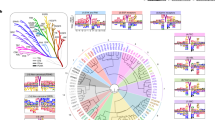Abstract
FROM kinetic and other studies of hydrolyses catalysed by enzymes several important conclusions have emerged. One of these, coming particularly from pH studies, is that both an acid (−A−H) and a basic (−B) group are in some way involved in the reaction. A second conclusion is that there are two reaction intermediates, an addition (Michaelis) complex (ES) and an acylated enzyme (ES′), so that the process may be represented as:  The site that becomes acylated has been a matter of some controversy, both imidazole and serine being possibilities.
The site that becomes acylated has been a matter of some controversy, both imidazole and serine being possibilities.
This is a preview of subscription content, access via your institution
Access options
Subscribe to this journal
Receive 51 print issues and online access
$199.00 per year
only $3.90 per issue
Buy this article
- Purchase on Springer Link
- Instant access to full article PDF
Prices may be subject to local taxes which are calculated during checkout
Similar content being viewed by others
References
Wilson, I. B., and Bergmann, F., J. Biol. Chem., 185, 479 (1950). Wilson, I. B., ibid., 197, 215 (1952).
Augustinsson, K.-B., Acta Physiol. Scand., 15, Supp. 52 (1948).
Augustinsson, K.-B., and Nachmansohn, D., J. Biol. Chem., 179, 543 (1949).
Krupka, R. M., and Laidler, K. J., J. Amer. Chem. Soc., 83, 1458 (1961).
Author information
Authors and Affiliations
Rights and permissions
About this article
Cite this article
KRUPKA, R., LAIDLER, K. Molecular Mechanisms for Hydrolytic Enzyme Action. Nature 190, 916–918 (1961). https://doi.org/10.1038/190916a0
Issue Date:
DOI: https://doi.org/10.1038/190916a0
This article is cited by
-
Multi-Step Mechanisms for Cholinesterase Activity
Nature (1962)
Comments
By submitting a comment you agree to abide by our Terms and Community Guidelines. If you find something abusive or that does not comply with our terms or guidelines please flag it as inappropriate.



